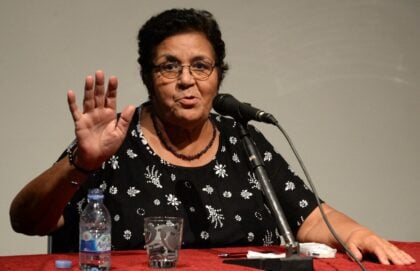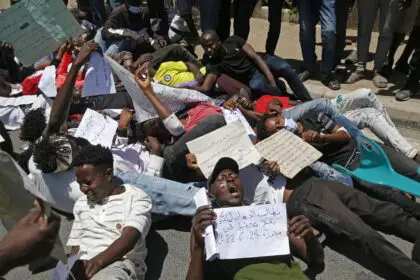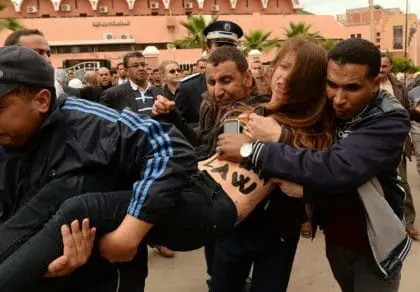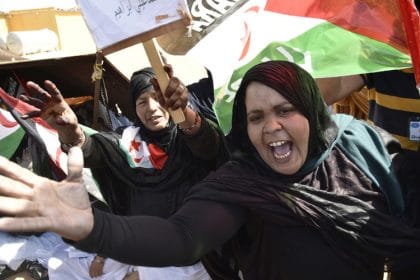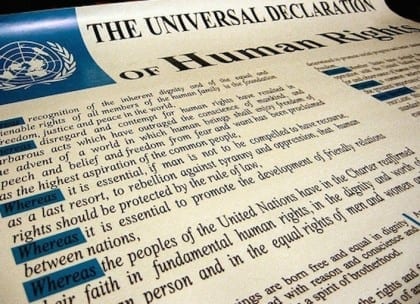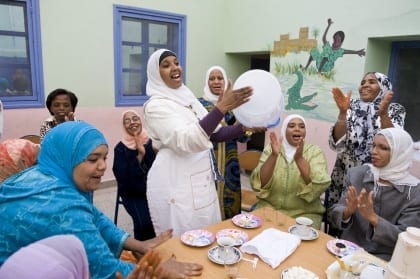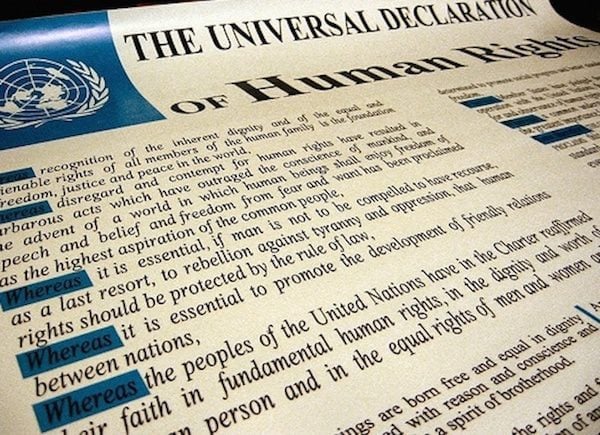
Introduction
The concept of human rights has become a well-known and widely accepted term to use. Varying interpretations are possible, with differences usually being based on cultural background. Nonetheless, most of these understandings consciously or subconsciously include the basic rights outlined in the United Nations’ Universal Declaration of Human Rights.
The United Nations General Assembly (GA) adopted the Universal Declaration of Human Rights on December 10th, 1948. It was written in the aftermath of World War II, “… as a common standard of achievement for all peoples and all nations, to the end that every individual and every organ of society, keeping this Declaration constantly in mind…” Thus it was truly meant to be universal, to protect citizens from any type of violation the world had recently experienced, as outlined in the Preamble and 30 Articles.
As such, it includes articles on the right to life in dignity; liberty and security; freedom of movement; right to nationality and education; just treatment of human beings and respect; as well as freedom of expressions and opinions, from torture or inhumane treatment, as well as economic, social and cultural rights.
International Human Rights Law
The Declaration is not legally binding, but is the basis of international human rights law. Two binding UN covenants were formed as a result of the UDHR; the International Covenant on Civil and Political Rights and the International Covenant on Economic, Social and Cultural Rights. Combined, these three documents are often referred to as the “International Bill of Human Rights”.
Over the years other conventions have been written to expand on and add to this fundament, focusing on a variety of topics such as refugees (1951 and 1967), discrimination of women (‘CEDAW’, 1979) and disabled persons (2008), against torture (1987), protection of migrant workers (1990), and against racial discrimination (1969) to name a few.
Additionally, the International Labour Organization has compiled a large number of conventions specifically related to work force and labour standards, of which 8 are considered ‘fundamental conventions’ and relate to freedom of association (1948, C087), collective bargaining (1949, C098), forced labour (1930, C029 and 1957, C105), minimum age (1973, C138), child labour (1999, C182), equal remuneration (1951, C100), equal opportunity and treatment (C111).
Geneva Conventions
The Geneva Conventions are a revision of previously constructed conventions, adjusted after WWII and specifically focus on treatment of persons in time of war. It consists of four Conventions, and three additional protocols. The International Committee of the Red Cross (ICRC) explains that the Conventions “aims at ensuring that, even in the midst of hostilities, the dignity of the human person, universally acknowledged in principle, shall be respected.”
During a series of expert meetings, congregations by Red Cross agencies, and a confluence of government representatives over time, the articles were revised until a draft was represented at The Diplomatic Conference for the Establishment of International Conventions for the Protection of Victims of War in 1949. The Final Act was signed by fifty-nine nations, some of which no longer exist, and has attained more signatories since.
The Cairo Declaration on Human Rights in Islam (CDHRI) was compiled by the Organisation of Islamic Cooperation (OIC) in 1990, during the 19th Islamic Conference of Foreign Ministers in Cairo, and has 57 signatories. This Declaration holds similar – if not identical – principles as the UDHR, but notably also included articles related to ‘jus in bello’ – acceptable wartime conduct, alike the Geneva Conventions.
The CDHRI also addresses equality between women and men, rights of the child, freedom, right to medical care, right to self-determination, amongst others. Most notably is that this 25 Article document clearly lists the Sharia as reference point including for punishment. The CDHRI has been adopted by 45 countries, out of the total 57 members of the OIC.
Conventions Signed By Morocco
Morocco signed the Conventions on 26 July 1956, Additional Protocol I (Protection of Victims of International Armed Conflicts) and Additional Protocol II (Protection of Victims of Non-International Armed Conflicts) on 3 June 2011. Moreover, Morocco became signatory to the Convention for the Rights of the Child (CRC) on 21 June 1993, as well as the Optional Protocol to the CRC on 22 May 2002.
Morocco has been member of the OIC since 1969, and the only fundamental ILO convention not ratified is that related to freedom of association (C087).
Refugees
The Convention relating to the Status of Refugees is based off Article 14 of the UDHR, and recognizes the right of asylum and protection of refugees. It was approved during the General Assembly meeting of December 14, 1950 and came into force on April 22, 1954. However, the original Convention limited its scope to refugees fleeing prior to 1 January 1951. As such, an additional protocol was compiled in 1967, removing these limitations.
On 7 November 1956, it became successor to the Convention and Protocol. Succession, in relation to multilateral treaties, means the State expressed its consent to be considered as bound thereby.
Women
The Convention on the Elimination of All Forms of Discrimination against Women – also called CEDAW, was approved during the General Assembly Session on 18 December, 1979 and entered into force on 3 September 1981. Morocco acceded to CEDAW on 21 June 1993. Through “accession” a state accepts the offer or the opportunity to become a party to a treaty, which has already negotiated and signed by other states. It has the same legal effect as ratification. Countries that have ratified or acceded CEDAW are legally bound to put its provisions into practice, and thereby agree to submit national reports on measures taken to comply with its obligations. Such reports are to be compiled at least every four years.
Declarations were made regarding reservations against Article 2, condemning discrimination against women – provided it is in line with the Kingdom’s constitution and do not contradict Sharia or its derivative Moroccan Code of Personal Status; Article 15 (4), listing equality of freedom of movement can only be implemented if in accordance with the Personal Status code mentioned above; Article 9 (2), concerning children’s nationality – resulting from Moroccan law prescribing the mother’s nationality can only be carried over to the child of an unknown or stateless father; the provisions of Article 16, eliminating discrimination in marriage and family matters and child marriage – stating its incompatibility with Islamic Sharia, specifically paragraph (1c) regarding divorce.
Additionally, Morocco considers itself as not bound to Article 29 (1), discussing dispute between states concerning interpretation or application of the Convention. It is noteworthy that Article 29 (2) specifically allows for such a reservation.
Persons with Disabilities
The Convention on the Rights of Persons with Disabilities was approved during the General Assembly session on December 13, 2006 and came into force on May 3, 2008. Simultaneously, the Optional Protocol was approved, giving the Committee on the Rights of Persons with Disabilities (CRPD) competence to examine individual complaints with regard to alleged violations by States parties to the Protocol. The CRPD is the body of independent experts that monitors implementation of the Convention. Morocco signed the Convention on March 30, 2007 and ratified it on April 8, 2009 without any reservations. On the date of its ratification, it also acceded to the Optional Protocol.
Torture
The Convention against Torture and Other Cruel, Inhuman, or Degrading Treatment or Punishment, also referred to as just the Convention against Torture, was adopted during the General Assembly session on December 10, 1984. On June 26, 1987 it was registered and thereby came into force. Its implementation is monitored by the Committee Against Torture (CAT), composed of ten individuals of various nationalities. All signatory states are obliged to send regular reports to the CAT, based on which recommendations are made.
Morocco signed the Convention on January 8, 1986 and ratified it on June 21, 1993. It made reservations to Article 30 paragraph 1, referring to disputes between States related to interpretation or application of the Convention, stating it does not consider itself bound to the Article as allowed for per Article 30-2. On October 19, 2006 the Moroccan government declared its recognition of the Committee’s competences as per Article 22.
Migrant Workers
The International Convention on the Protection of the Rights of All Migrant Workers and Members of their Families was approved by the General Assembly on December 18, 1990 and entered into force on July 1, 2003. Morocco signed the Convention on August 15, 1991 and ratified it on June 21, 1993. Reservation was made to Article 92-1 referring to disputes arising pertaining to interpretation or application of the Convention. Morocco noted it does not consider itself bound by this paragraph, as allowed for by Article 92-2.
Racial Discrimination
The Convention on the Elimination of All Forms of Racial Discrimination was approved by the General Assembly and accordingly opened for signature on March 7, 1966. It entered into force on January 4, 1969. Despite the obvious as stated in the Convention title, it aims to obliterate hate speech and promote understanding. Implementation of the articles is monitored by the Committee on the Elimination of Racial Discrimination, to which bi-annual reports are submitted by each signatory. It also is responsible for handling inter-state and individual complaints related to non-conformity to the provisions of the Convention, as prescribed in Article 14.
Morocco signed the Convention on September 18, 1967 and ratified it on December 18, 1970. It made a reservation upon accession regarding Article 22 and it not considering itself bound to its provisions, which pertain to inter-state dispute resulting from interpretation or implementation of the Convention, stating that all parties to the dispute are to expressly consent to intervention of the International Court of Justice.
On October 19, 2006 Morocco declared its recognition of the competences of the Committee on the Elimination of Racial Discrimination in accordance with Article 14.
Human Rights in Morocco
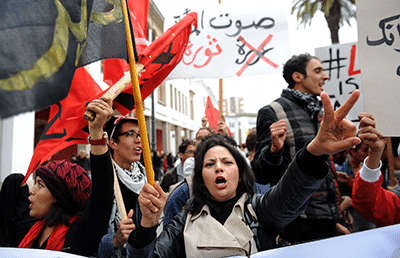
The new Constitution (approved by referendum in 2012) specifically prohibits attacks on a person’s physical or moral integrity; cruel inhuman or degrading treatment; and torture (Article 22). Arbitrary detention and forced disappearances are prohibited.
Everyone is guaranteed a presumption of innocence. Genocide and incitement to racism and violence are forbidden. The 1996 Constitution, which it replaced, was much more general, stating simply that no one could be arrested, imprisoned, or punished, except in accordance with the law (Article 10).
The difference in content and wording is significant, because it represents a realization, since the beginning of the current King’s reign (1999), that the record of human rights in Morocco is a dark one.
During the ‘years of lead’ from the 1960s to the late 1980s, the Moroccan government was known for extreme repression of its opponents, who were initially left-wingers and later Islamists. The most important leftist leader, Mehdi Ben Barka, was exiled to Paris, where he was kidnapped and assassinated in 1965.
The repression became particularly severe after the attempted coups in the early 1970s, and a Moroccan gulag was established. Among the most celebrated prisoners were the family of the regime’s former internal-security chief and Interior Minister, Mohammed Oufkir, who was himself accused of participating in the 1972 coup and died immediately afterwards. According to his family, he was executed by the regime, although official sources claimed that he committed suicide.
His family was arrested and imprisoned in secret camps in the desert until their release in 1991, following European pressure. Other participants in the coup were held, along with later victims, in a secret prison at Tazmamart, in the Atlas mountains, where conditions were extraordinarily harsh. In the final years of King Hassan II’s reign, the repression lessened, and prisoners were released. Many wrote books describing their experiences.
After he came to the throne, King Mohammed VI responded to the growing pressure for abuses to be exposed, and he established the Equity and Reconciliation Commission in January 2004. It was set up to investigate forced disappearances and arbitrary detention between 1956 and 1999, to rule on reparations, and to determine ‘the responsibility of the state agencies or any other party’.
Its final report was released to the public in December 2005, but its findings were muted. No public officials have ever been charged, but extensive compensation was ordered. Most importantly, the commission recommended the creation of new mechanisms to protect human rights.
This led to the establishment of an independent Council on Human Rights, but some of the commission’s other recommendations – ending the death penalty and ratifying the statute of the International Criminal Court, for instance – have not been carried out.
Morocco’s record on human rights has not been reformed as much as the public investigation of past abuses suggests. In 2012 Human Rights Watch continued to report arbitrary arrests and the use of torture. Human-rights activists are at risk of arrest and imprisonment for long periods after trial. Investigative journalism is curtailed when its criticisms of the government are judged excessive.
Pressure for human-rights reform continued during the Arab Spring movement of 2011 and led to the formulation of the human-rights provisions of the new Constitution.
Latest Articles
Below are the latest articles by acclaimed journalists and academics concerning the topic ‘Human Rights’ and ‘Morocco’. These articles are posted in this country file or elsewhere on our website:


